- Campaign
Literature « 1992
Democratic Presidential Primary «
Clinton for President Committee
1992 Democratic Presidential Primary
Clinton for President Committee
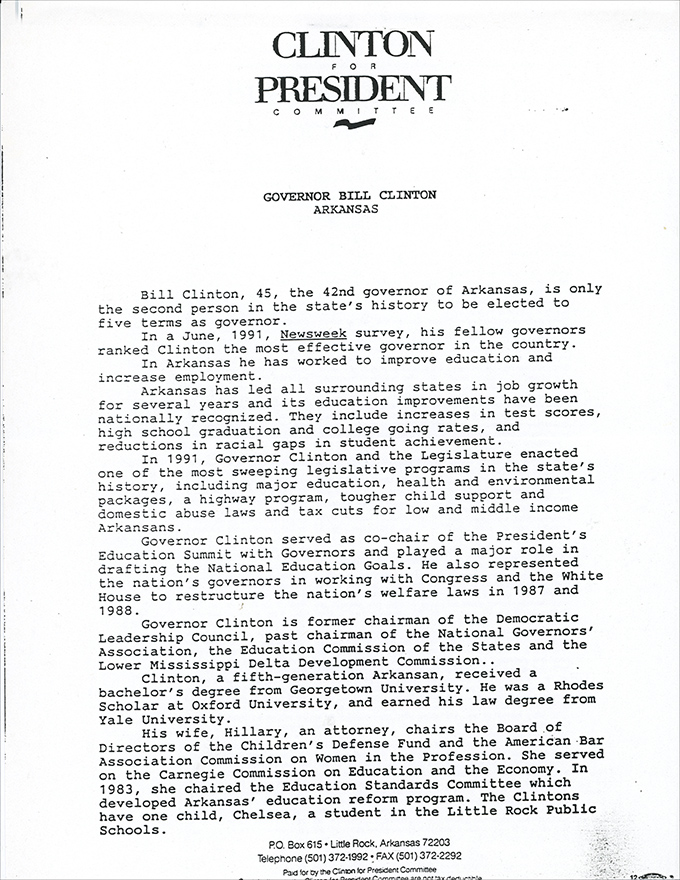 |
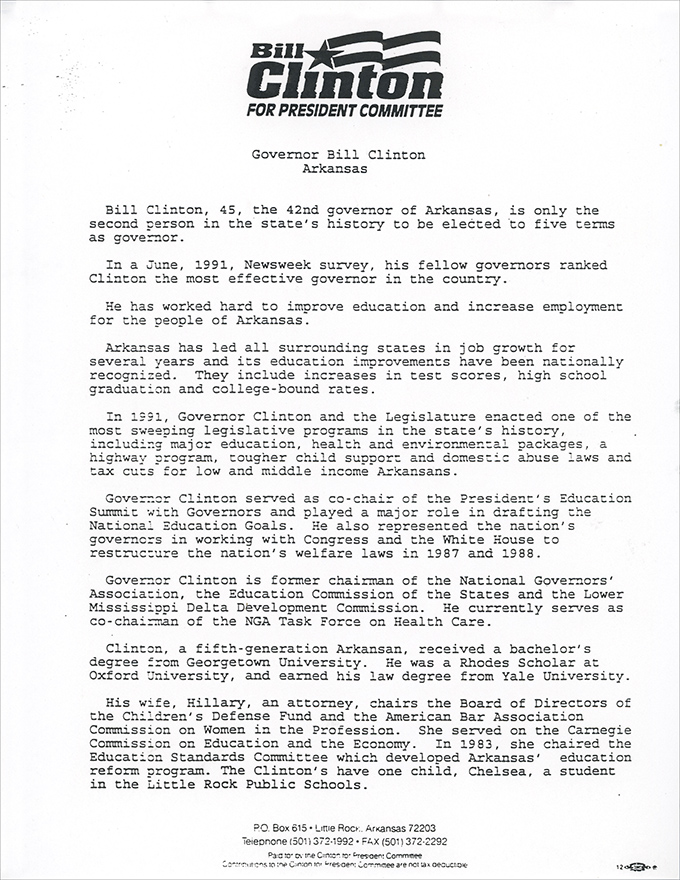
|
|
| Bios - 8
1/2" x 11". (earlier and later versions with minor tweaks) |
|
| GOVERNOR
BILL CLINTON ARKANSAS Bill Clinton, 45, the 42nd governor of Arkansas, is only the second person in the state's history to be elected to five terms as governor. In a June, 1991, Newsweek survey, his fellow governors ranked Clinton the most effective governor in the country. In Arkansas he has worked to improve education and increase employment. Arkansas has led all surrounding states in job growth for several years and its education improvements have been nationally recognized. They include increases in test scores, high school graduation and college going rates, and reductions in racial gaps in student achievement. In 1991, Governor Clinton and the Legislature enacted one of the most sweeping legislative programs in the state's history, including major education, health and environmental packages, a highway program, tougher child support and domestic abuse laws and tax cuts for low and middle income Arkansans. Governor Clinton served as co-chair of the President's Education Summit with Governors and played a major role in drafting the National Education Goals. He also represented the nation's governors in working with Congress and the White House to restructure the nation's welfare laws in 1987 and 1988. Governor Clinton is former chairman of the Democratic Leadership Council, past chairman of the National Governors' Association, the Education Commission of the States and the Lower Mississippi Delta Development Commission .. Clinton, a fifth-generation Arkansan, received a bachelor's degree from Georgetown University. He was a Rhodes Scholar at Oxford University, and earned his law degree from Yale University. His wife, Hillary, an attorney, chairs the Board .of Directors of the Children's Defense Fund and the American-Bar Association Commission on Women in the Profession. She served on the Carnegie Commission on Education and the Economy. In 1983, she chaired the Education Standards Committee which developed Arkansas' education reform program. The Clintons have one child, Chelsea, a student in the Little Rock Public Schools. |
Governor
Bill Clinton Arkansas Bill Clinton, 45, the 42nd governor of Arkansas, is only the second person in the state's history to be elected to five terms as governor. In a June, 1991, Newsweek survey, his fellow governors ranked Clinton the most effective governor in the country. He has worked hard to improve education and increase employment for the people of Arkansas. Arkansas has led all surrounding states in job growth for several years and its education improvements have been nationally recognized. They include increases in test scores, high school graduation and college-bound rates. In 1991, Governor Clinton and the Legislature enacted one of the most sweeping legislative programs in the state's history, including major education, health and environmental packages, a highway program, tougher child support and domestic abuse laws and tax cuts for low and middle income Arkansans. Governor Clinton served as co-chair of the President's Education Summit with Governors and played a major role in drafting the National Education Goals. He also represented the nation's governors in working with Congress and the White House to restructure the nation's welfare laws in 1987 and 1988. Governor Clinton is former chairman of the National Governors' Association, the Education Commission of the States and the Lower Mississippi Delta Development Commission. He currently serves as co-chairman of the NGA Task Force on Health Care. Clinton, a fifth-generation Arkansan, received a bachelor's degree :ram Georgetown University. He was a Rhodes Scholar at Oxford University, and earned his law degree from Yale University. His wife, Hillary, an attorney, chairs the Board of Directors of the Children's Defense Fund and the American Bar Association Commission on Women in the Profession. She served on the Carnegie Commission on Education and the Economy. In 1983, she chaired the Education Standards Committee which develooed Arkansas' education reform program. The Clinton's have one chiid, Chelsea, a student in the Little Rock Public Schools. |
PO Box 615 • Little Rock, Arkansas 72203
Telephone (501) 372-1992 • FAX (501) 372-2292
Paid for by the Clinton for President Committee
Contributions to the Clinton for President Committee are not tax deductible. [union bug]
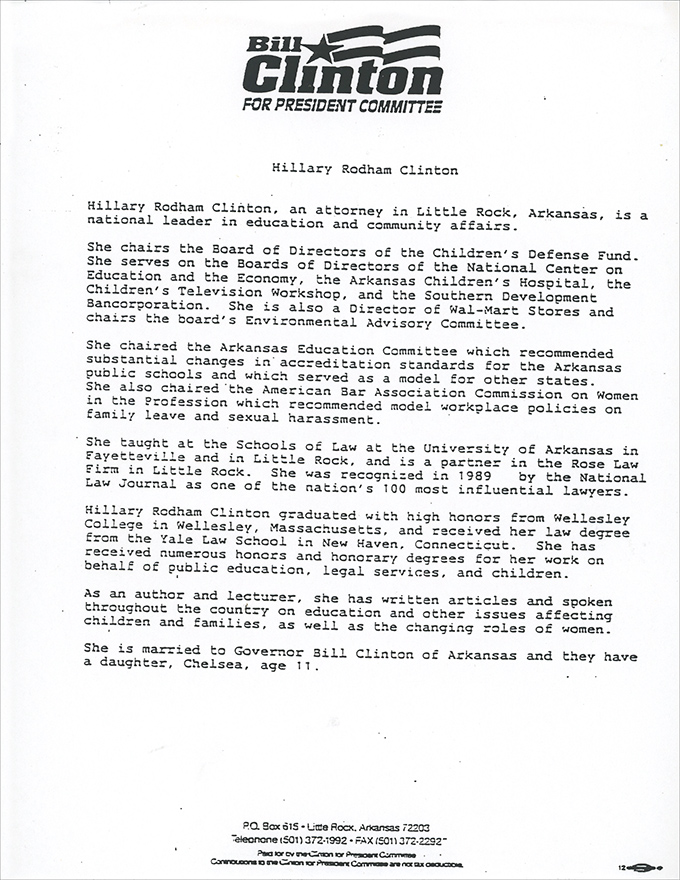 |
|
|
| Bio -
8 1/2" x 11". |
|
Hillary Rodham Clinton, an attorney in Little Rock, Arkansas, is a national leader in education and community affairs.
She chairs the Board of Directors of the Children's Defense Fund. She serves on the Boards of Directors of the National Center on Education and the Economy, the Arkansas Children's Hospital, the Children's Television Workshop, and the Southern Development Bancorporation. She is also a Director of Wal-Mart Stores and chairs the board's Environmental Advisory Committee.
She chaired the Arkansas Education Committee which recommended substantial changes in·accreditation standards for the Arkansas public schools and which served as a model for other states.
She also chaired ·the American Bar Association Commission on Women in the Profession which recommended model workplace policies on family leave and sexual harassment.
She taught at the Schools of Law at the University of Arkansas in Fayetteville and in Little Rock, and is a partner in the Rose Law Firm in Little Rock. She was recogni:ed in 1989 by the National Law Journal as one of the nation's 100 most influential lawyers.
Hillary Rcdham Clinton graduated with high honers from Wellesley College in Wellesley, Massachusetts, and received her law degree from the Yale Law School in New Haven, Connectiut. She has received numerous honers and honorary degrees for her work on behalf of public education, legal services, and children.
As an author and lecturer, she has written articles and spoken throughout the councry on education and other issues affecting children and families, as well as the changing roles of women.
She is married to Governor Bill Clinton of Arkansas and they have a daughter, Chelsea, age 11.
PO Box 615 • Little Rock, Arkansas 72203
Telephone (501) 372-1992 • FAX (501) 372-2292
Paid for by the Clinton for President Committee
Contributions to the Clinton for President Committee are not tax deductible. [union bug]
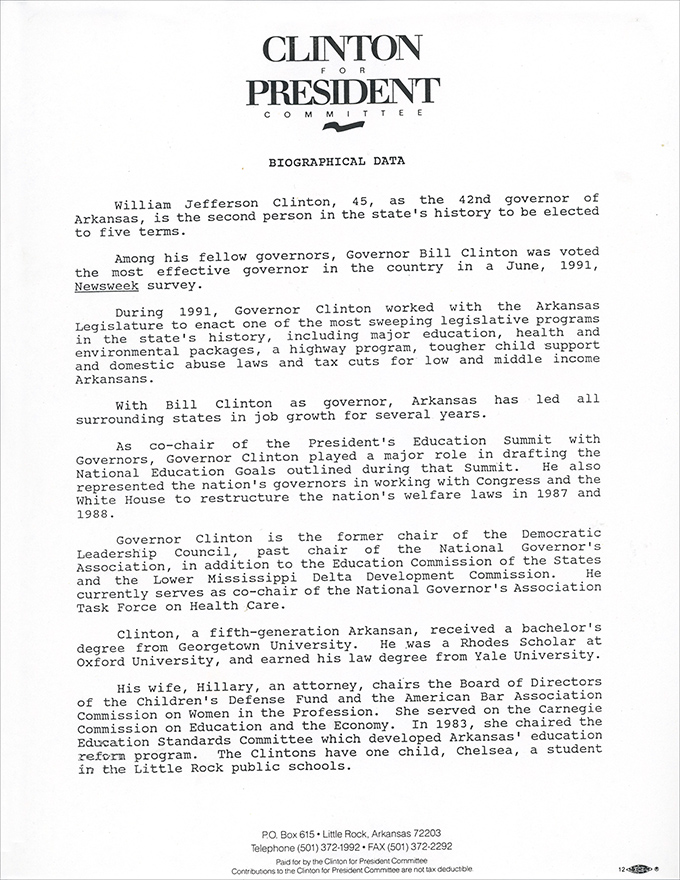 |
||
| Bio -
8 1/2" x 11". |
|
William Jefferson Clinton, 45, as the 42nd governor of Arkansas, is the second person in the state's history to be elected to five terms.
Among his fellow governors, Governor Bill Clinton was voted the most effective governor in the country in a June, 1991, Newsweek survey.
During 1991, Governor Clinton worked with the Arkansas Legislature to enact one of the most sweeping legislative programs in the state's history, including major education, health and environmental packages, a highway program, tougher child support and domestic abuse laws and tax cuts for low and middle income Arkansans.
With Bill Clinton as governor, Arkansas has led all surrounding states in job growth for several years.
As co-chair of the President's Education Summit with Governors, Governor Clinton played a major role in drafting the National Education Goals outlined during that Summ'it. He also represented the nation's governors in working with Congress and the White House to restructure the nation's welfare laws in 1987 and 1988.
Governor Clinton is the former chair of the Democratic Leadership Council, past chair of the National Governor's Association, in addition to the Education Commission of the States and the Lower Mississippi Delta Development Commission. He currently serves as co-chair of the National Governor's Association Task Force on Health Care.
Clinton, a fifth-generation Arkansan, received a bachelor's degree from Georgetown University. He was a Rhodes Scholar at Oxford University, and earned his law degree from Yale University.
His wife, Hillary, an attorney, chairs the Board of Directors of the Children's Defense Fund and the American Bar Association Commission on Women in the Profession. She served on the Carnegie Commission on Education and the Economy. In 1983, she chaired the Education Standards Committee which developed Arkansas' education reJ:c·nn program. The Clintons have one child, Chelsea, a student in the Little Rock public schools.
PO Box 615 • Little Rock, Arkansas 72203
Telephone (501) 372-1992 • FAX (501) 372-2292
Paid for by the Clinton for President Committee
Contributions to the Clinton for President Committee are not tax deductible. [union bug]
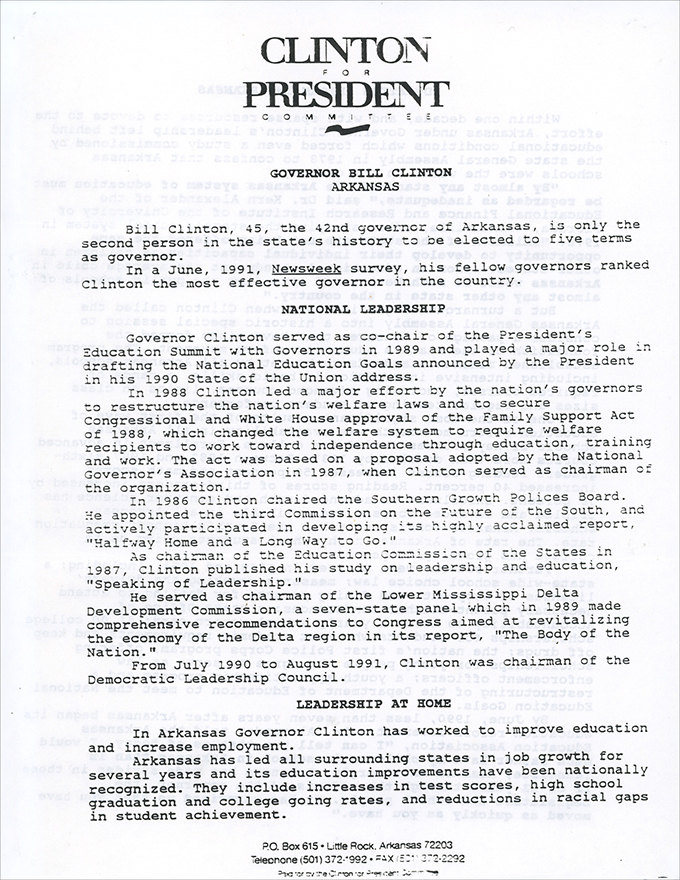 |
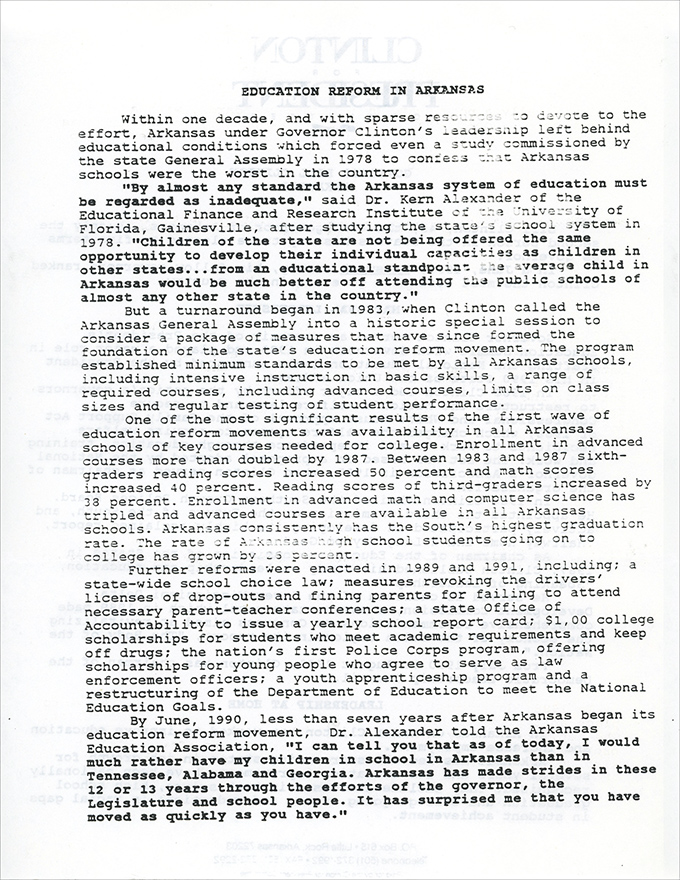 |
|
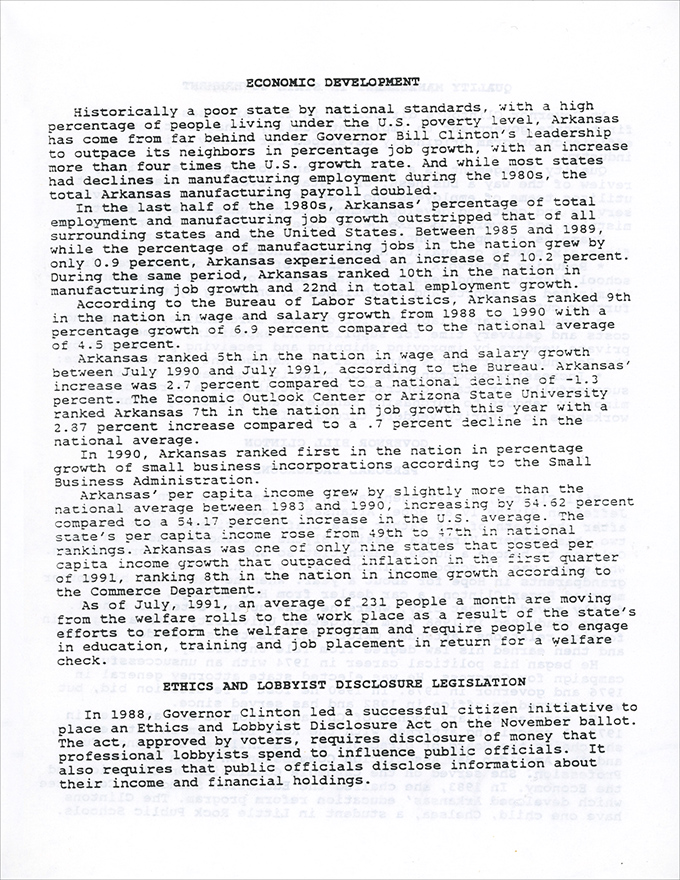 |
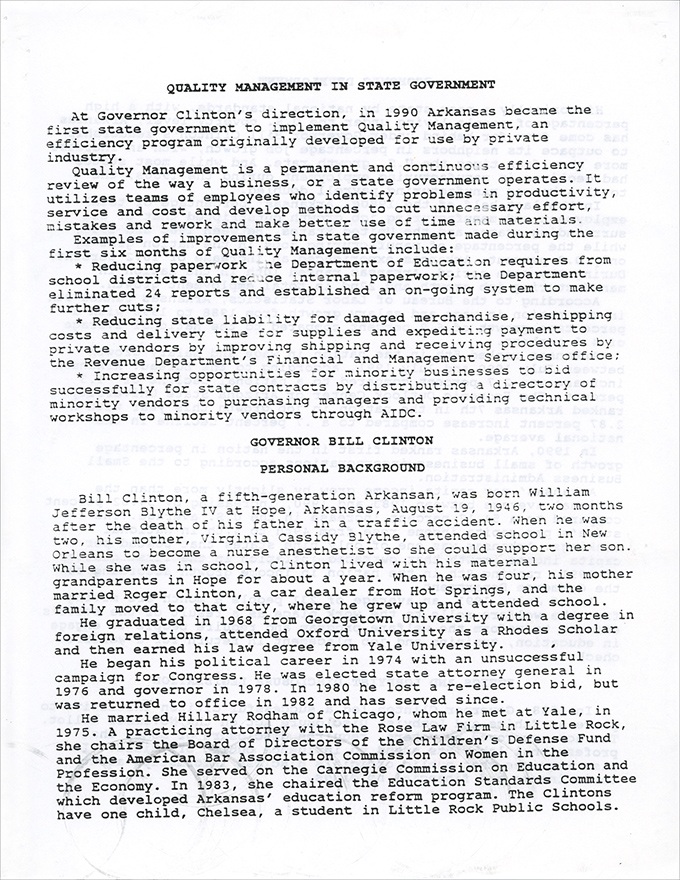 |
|
| Bio -
8 1/2" x 11", 4 pages. |
|
GOVERNOR BILL CLINTON
ARKANSAS
Bill Clinton, 45, the 42nd governor of Arkansas, is only the second person in the state's history to be elected to five terms as governor.
In a June, 1991, Newsweek survey, his fellow governors ranked Clinton the most effective governor in the country.
NATIONAL LEADERSHIP
Governor Clinton served as co-chair of the President's Education Summit with Governors in 1989 and played a major role in drafting the National Education Goals announced by the President in his 1990 State of the Union address.
In 1988 Clinton led a major effort by the nation's governors to restructure the nation's welfare laws and to secure Congressional and White House approval of the Family Support Act of 1988, which changed the welfare system to require welfare recipients to work toward independence through education, training and work. The act was based on a proposal adopted by the National Governor's Association in 1987, when Clinton served as chairman of the organization.
In 1986 Clinton chaired the Southern Growth Polices Board. He appointed the third Commission on the Future of the South, and actively participated in developing its highly acclaimed report, "Halfway Home and a Long Way to Go."
As chairman of the Education Commission of the States in 1987, Clinton published his study on leadership and education, "Speaking of Leadership."
He served as chairman of the Lower Mississippi Delta Development Commission, a seven-state panel which in 1989 made comprehensive recommendations to Congress aimed at revitalizing the economy of the Delta region in its report, "The Body of the Nation."
From July 1990 to August 1991, Clinton was chairman of the Democratic Leadership Council.
LEADERSHIP AT HOME
In Arkansas Governor Clinton has worked to improve education and increase employment.
Arkansas has led all surrounding states in job growth for several years and its education improvements have been nationally recognized. They include increases in test scores, high school graduation and college going rates, and reduction in racial gaps in student achievement.
EDUCATION REFORM IN ARKANSAS
Within one decade, and with sparse resources to devote to the effort, Arkansas under Governor Clinton's leadership left behind educational conditions which forced even a study commissioned by the state General Assembly in 1978 to confess that Arkansas schools were the worst in the country.
"By almost any standard the Arkansas system of education must be regarded as inadequate," said Dr. Kern Alexander of the Educational Finance and Research Institute of the University of Florida, Gainesville, after studying the state's school system in 1978. "Children of the state are not being offered the same opportunity to develop their individual capacities as children in other states ... from an educational standpoint the average child in Arkansas would be much better off attending the public schools of almost any other state in the country."
But a turnaround began in 1983, when Clinton called the Arkansas General Assembly into a historic special session to consider a package of measures that have since formed the foundation of the state's education reform movement. The program established minimum standards to be met by all Arkansas schools, including intensive instruction in basic skills, a range of required courses, including advanced courses, limits on class sizes and regular testing of student performance.
One of the most significant results of the first wave of education reform movements was availability in all Arkansas schools of key courses needed for college. Enrollment in advanced courses more than doubled by 1987. Between 1983 and 1987 sixth-graders reading scores increased 50 percent and math scores increased 40 percent. Reading scores of third-graders increased by 38 percent. Enrollment in advanced math and computer science has tripled and advanced courses are available in all Arkansas schools. Arkansas consistently has the South's highest graduation rate. The rate of Arkansas high school students going on to college has grown by 26 percent.
Further reforms were enacted in 1989 and 1991, including; a state-wide school choice law; measures revoking the drivers' licenses of drop-outs and fining parents for failing to attend necessary parent-teacher conferences; a state Office of Accountability to issue a yearly school report card; $1,00 college scholarships for students who meet academic requirements and keep off drugs; the nation's first Police Corps program, offering scholarships for young people who agree to serve as law enforcement officers; a youth apprenticeship program and a restructuring of the Department of Education to meet the National Education Goals.
By June, 1990, less than seven years after Arkansas began its education reform movement, Dr. Alexander told the Arkansas Education Association, "I can tell you that as of today, I would much rather have my children in school in Arkansas than in Tennessee, Alabama and Georgia. Arkansas has made strides in these 12 or 13 years through the efforts of the governor, the Legislature and school people. It has surprised me that you have moved as quickly as you have."
ECONOMIC DEVELOPMENT
Historically a poor state by national standards, with a high percentage of people living under the U.S. poverty level, Arkansas has come from far behind under Governor Bill Clinton's leadership to outpace its neighbors in percentage job growth, with an increase more than four times the U.S. growth rate. And while most states had declines in manufacturing employment during the 1980s, the total Arkansas manufacturing payroll doubled.
In the last half of the 1980s, Arkansas' percent.age of total employment and manufacturing job growth outstripped that of all surrounding states and the United States. Between 1985 and 1989, while the percentage of manufacturing jobs in the nation grew by only 0.9 percent, Arkansas experienced an increase of 10.2 percent. During the same period, Arkansas ranked 10th in the nation in manufacturing job growth and 22nd in total employment growth.
According to the Bureau of Labor Statistics, Arkansas ranked 9th in the nation in wage and salary growth from 1988 to 1990 with a percentage growth of 6.9 percent compared to the national average of 4.5 percent.
Arkansas ranked 5th in the nation in wage and salary growth between July 1990 and July 1991, according to the Bureau. Arkansas' increase was 2.7 percent compared to a national decline of -1.3 percent. The Economic Outlook Center or Arizona State University ranked Arkansas 7th in the nation in job growth this year with a 2.37 percent increase compared to a .7 percent decline in the national average.
In 1990, Arkansas ranked first in the nation in percentage growth of small business incorporations according to the Small Business Administration.
Arkansas' per capita income grew by slightly more than the national average between 1983 and 1990; increasing by 54.62 percent compared to a 54.17 percent increase in the U.S. average. The state's per capita income rose from 49th to 47th in national rankings. Arkansas was one of only nine states that posted per capita income growth that outpaced inflation in the first quarter of 1991, ranking 8th in the nation in income growth according to the Commerce Department.
As of July, 1991, an average of 231 people a month are moving from the welfare rolls' to the work place as a result of the state's efforts to reform the welfare program and require people to engage in education, training and job placement in return for a welfare check.
ETHICS AND LOBBYIST DISCLOSURE LEGISLATION
In 1988, Governor Clinton led a successful citizen initiative to place an Ethics and Lobbyist Disclosure Act on the November ballot. The act, approved by voters, requires disclosure of money that professional lobbyists spend to influence public officials. It also requires that public officials disclose information about their income and financial holdings.
QUALITY MANAGEMENT IN STATE GOVERNMENT
At Governor Clinton's direction, in 1990 Arkansas became the first state government to implement Quality Management, an efficiency program originally developed for use by private industry.
Quality Management is a permanent and continuous efficiency review of the way a business, or a state government operates. It utilizes teams of employees who identify problems in productivity, service and cost and develop methods to cut unnecessary effort, mistakes and rework and make better use of time and materials.
Examples of improvements in state government made during the first six months of Quality Management include:
* Reducing paperwork the Department of Education requires from school districts and reduce internal paperwork; the Department eliminated 24 reports and established an on-going system to make further cuts;
* Reducing state liability for damaged merchandise, reshipping costs and delivery time fer supplies and expediting payment to private vendors by improving shipping and receiving procedures by the Revenue Department's Financial and Management Services office;
* Increasing opportunities for minority businesses to bid successfully for state contracts by distributing a directory of minority vendors to purchasing managers and providing technical workshops to minority vendors through AIDC.
GOVERNOR BILL CLINTON
PERSONAL BACKGROUND
Bill Clinton, a fifth-generation Arkansan, was born William Jefferson Blythe IV at Hope, Arkansas, August 19, 1946, two months after the death of his father in a traffic accident. When he was two, his mother, Virginia Cassidy Blythe, attended school in New Orleans to become a nurse anesthetist so she could support her son. While she was in school, Clinton lived with his maternal grandparents in Hope for about a year. When he was four, his mother married Roger Clinton, a car dealer from Hot Springs, and the family moved to that city, where he grew up and attended school.
He graduated in 1968 from Georgetown University with a degree in foreign relations, attended Oxford University as a Rhodes Scholar and then earned his law degree from Yale University.
He began his political career in 1974 with an unsuccessful campaign for Congress. He was elected state attorney general in 1976 and governor in 1978. In 1980 he lost a re-election bid, but was returned to office in 1982 and has served since.
He married Hillary Rodham of Chicago, whom he met at Yale, in 1975. A practicing attorney with the Rose Law Firm in Little Rock, she chairs the Board of Directors of the Children's Defense Fund and the American Bar Association Commission on Women in the Profession. She served on the Carnegie Commission on Education and the Economy. In 1983, she chaired the Education Standards Committee which developed Arkansas' education reform program. The Clintons have one child, Chelsea, a student in Little Rock Public Schools.
P.O. Box 615 Little Rock, Arkansas 72203
Telephone (501) 372-1992 FAX (501) 372-2292
Paid for the Clinton for President Committee

